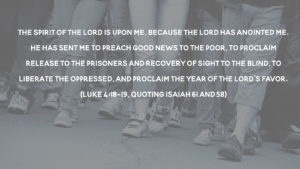 “How do you get away with doing all that activism stuff with the youth?”
“How do you get away with doing all that activism stuff with the youth?”
I was recently asked this question by someone who has existed in enough church circles to know that, well, being this sort of youth group would be swimming upstream.
He continued, “Don’t you get pushback?”
This person was thrilled that I have been vocal about my vision and philosophy for what ministry with and among students can look like, and was asking these questions, seemingly, with a mixture of lament and disbelief over the status quo.
There is a deeply rooted understanding that the Christian message is primarily propositional—a set of intellectual data that one must agree with. This is chief above all else. Any sort of action that is related to its propositional nature is great (“Indeed, the Bible encourages us to do good works,” people say.), but those are ultimately of secondary concern to the primary need to transfer of salvific information.
This bifurcation of grace and works was indeed helpful for 16thcentury Western Christianity, and even 5thcentury Roman Christianity. However, it was not a concern for Jesus and the early church!
Jesus’ introductory moment in Luke’s Gospel shows this well:

The good news is, indeed, something preached, but also included is health, freedom, and the cancelling of decades-old debts (“the year of the Lord’s favor” is a reference to this event in Leviticus).
Jesus, and the authors of the New Testament, were not concerned solely or primarily with propositional truth. They were concerned that people’s lives would be caught up into the life of God and that they would choose that life of joy, love, and peace over against their former lives. In other words, they were hoping people would encounter new creation, the hope of the Jewish (and, therefore, Christian) worldview.
There was recently a Statement published by some prominent members of the evangelical Christian community which stated:
“This also means that implications and applications of the gospel, such as the obligation to live justly in the world, though legitimate and important in their own right, are not definitional components of the gospel.” statementonsocialjustice.com
 There are deep roots like this in Western Christianity. It is why my friend wondered how the youth at Emmanuel are able to go to the AIDS Walk wearing shirts that say “God cares about you,” or to March for Our Lives wearing shirts that say “Jesus loves the children.”
There are deep roots like this in Western Christianity. It is why my friend wondered how the youth at Emmanuel are able to go to the AIDS Walk wearing shirts that say “God cares about you,” or to March for Our Lives wearing shirts that say “Jesus loves the children.”
So, why do we do it?
It is because it is good news. We trust and follow a Jesus who heals. He invites the children. He overturns the tables of the powerful. He brings in the outcast. He turns his cheek. He blesses the mourners, the hungry, and the peacemakers. He weeps.
He gives himself away. Not propositionally, but actually. The good news of the Kingdom of God is Jesus giving himself away for the life of the world.
Good news is giving ourselves away too. And you can’t do that with propositions.
May we continue to live into the good news by following after Jesus, the Jesus who “did not regard his equality with God to mean exploiting. Instead he emptied himself” (Philippians 2).




I’m so glad that you are blogging about your thoughts and philosophies on your personal youth ministry at Em Prez, Jared. You are a voice of reason that I listen to willingly and happily because I know your character, love for Christ and humanity. Looking forward to hearing from you in the future and I think the young people you are discipling through your ministry are very blessed!
Thanks Wendy, I always enjoy our chats!